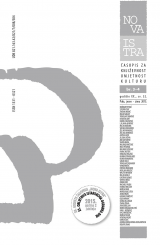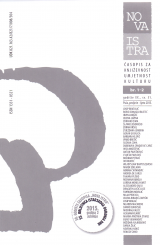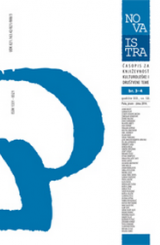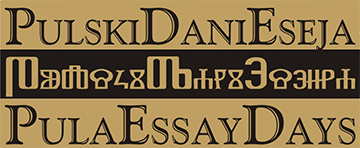Nova Istra No. 1/2001.

Nova Istra - Literary and Cultural Journal No. 1/2001.
In the editorial headed “Reading the Signs of Time”, the editor-in-chief, among other relevant information, gives his own views on the present autonomism (to a degree even separatism in certain political circles) as opposed to the contemporary European regionalism in the Croatian Istria. The main thesis is that politically sore situations in a radical way reflect culture as a specifically sensitive area of man’s creation.
The column “Contemporary Literature” regularly carries pieces written by Croatian writers, starting with those well-established authors, but also including the young ones who are yet to find their own affirmation.
This issue brings poems, short-stories, excerpts from novels, and a dramatic piece. We wish to single out the poetry written by a prominent contemporary Croatian poet, Milorad Stojević, the author of pronouncedly modernist poetic expression.
The column “New Translations” contains translations of foreign literature into the Croatian language, namely classical works of world literature as well as recent works written by authors less known or even unknown in Croatia.
This time we have published a new Croatian poetic translation of the 1st canto of “Inferno” by Dante Alighieri, translated by contemporary Croatian author and translator Ljerka Car Matutinović.
The same translator translated a few short stories by contemporary Italian author Antonio Tabucchi selected from his collection “Dreams of Dreams” (Sogni di Sogni).
We would like to draw attention to an extensive selection of texts (prose, verses, manifestos, etc.) by European dadaists, namely Tristan Tzara, André Breton, Richard Hülsenbeck, Walter Mehring, Francis Picabia, Hans Arp, and others.
The section “Studies and Reviews” carries an introductory text on today ignored and almost forgotten Italian author Girolamo Muzio (Mutius), 1496-
-1576, born in Padua but of Istrian origin on his father’s side. He was, for example, one of Torquato Tasso’s teachers. We have here published the translation by author Daniel Načinović of a part of Muzio’s treatise “The Knight” (Il Cavaliero).
This issue also carries an essay on the greatest Croatian poet of the 20th century, Tin Ujević (1891-1955), penned by one of the oldest living Croatian writers, Ivo Balentović.
The regional columns speak firstly of a significant Croatian cultural institution in Istria (Čakav Assembly) – marking the 30th anniversary of its establishing – and of its founder, writer Zvane Črnja (1920-1991).
We have also published one of the exemplary testimonies of communist and anti-Croatian pressures on the culture in the early 1970s when, by suppressing the movement of the so-called “Croatian Spring”, the Yugoslav statism, unitarism and centralism managed to obliterate any thought of independence and right to self-determination of all the peoples, and especially the Croatian, in ex-Yugoslavia for the next three decades.
Three historical miniatures on the greatest, three thousand years old Istrian city, Pula, share as their subject matter the destiny of the Roman theatre, the antique history of medicine in the area, as well as the story of the old and now forgotten Pula’s street-car.
The film essay published in this issue compares war movies of the 1990s by Steven Spielberg and Terrence Malick.
The column “Critical Approaches and Reviews” contains reviews of various recent titles in the field of fiction, history, religion. On this occasion we would like to single out the review of the novel “Kitchen” by young Japanese author Banana Yoshimoto, which has just been translated into Croatian, as well as a text on historical and contemporary characteristics of Italian irredentism.
This time the photo section invites you to a passage to India.



“ISTRA U DOMOVINSKOM RATU 1991. –...
- Autor: Darko Dukovski, Vedran Dukovski, Dario Matika
- Opseg: 780 stranica, bibliografija i sažetci
- Uvez: tvrdi, šivano, razdjelna vrpca
- Cijena: 300 kn / 40 €
NADA GRUBIŠIĆ: “GIBRALTAR”
- Autor: Nada Grubišić
- Opseg: 84 stranice
- Uvez: meki
- Cijena: 90 kn / 12 €
“Ima me”
- Autor: Tijana Vukić Stjelja
- Opseg: 119 stranica
- Uvez: tvrdi, šivano
- Cijena: 90 kn / 12,50 €
SKUPINA AUTORA: “ČAKAVSKI SABOR 1970. –...
- Autor: Jelena Lužina, Milan Rakovac, Josip Šiklić
- Opseg: 496 str.
- Uvez: tvrdi, plastificirani, lak
- Cijena: 400 kn / 53 €
VINKO BREŠIĆ: “KROATISTIČKA...
- Autor: Vinko Brešić
- Opseg: 175 stranica
- Uvez: tvrdi, šivano
- Cijena: 170 kn / 23 €
NADA GRUBIŠIĆ: “ROMEO U PUSTINJI”
- Autor: Nada Grubišić
- Opseg: 200 str
- Uvez: meki
- Cijena: 135 kn / 18 €
“Manipulacija”
- Autor: Skupina autora
- Opseg: 64 stranice
- Uvez: meki
- Cijena: 50 kn / 6,50 €
“Književni portret: Miroslav...
- Autor: Skupina autora
- Opseg: 86 str. + 90 min. DVD
- Uvez: Tvrdi, šivani
- Cijena: 135 kn / 18 €
MATE ĆURIĆ: “ZENGA”
- Autor: Mate Ćurić
- Opseg: 181 stranica
- Uvez: meki, šivano
- Cijena: 99 kn / 13.50 €
“Crkva svetog Nikole u Pazinu”
- Autor: Josip Šiklić
- Opseg: 157 stranica
- Uvez: tvrdi, šivano, ovitak
- Cijena: 225 kn

Nova Istra broj 3-4/2015.
- U sjećanje
- Suvremena književnost
- Tema: HRVATSKA KNJIŽEVNOST U SUSJEDSTVU
- Nagrada „Zvane Črnja“ za 2014.
- Novi prijevodi
- Studije, ogledi, zapisci
- U spomen: GORAN STARČEVIĆ
- Hrvati i Ukrajinci
- Prilozi o zavičaju
- Kritički pristupi i osvrti

Nova Istra broj 1-2/2015.
- U sjećanje
- Suvremena književnost
- Tema: ANTUN GUSTAV MATOŠ (1873.-1914.)
- Novi prijevodi
- Studije, ogledi, zapisci
- Prilozi o zavičaju
- Kritički pristupi i osvrti

Nova Istra broj 3-4/2014.
- Suvremena književnost
- Novi prijevodi
- Tema: Optimizam
- Nagrada "Zvane Črnja" za 2013.
- Ogledi i zapisci
- Tema: Politika i političari
- Prilozi o zavičaju
- Kritički pristupi i osvrti












